In his now-infamous speech, which was immediately pounced on and torn apart by environmentalists and opposition politicians, Abdul Khalim Abu Samah gave tabloid journalists an open goal when he declared that tiger populations will grow in deforested areas because prey animals will be easier for tigers to catch.
“In the forest reserve it is difficult for tigers to catch victims,” he said, prompting local tigers to suddenly question their ability to hunt effectively in forests, which they have managed to do pretty well for more than three million years.
Opposition member of parliament Lim Lip Eng was among the kindest of critics when he said the forestry director must have been dreaming of his house cat. One environmentalist said Kalilm’s comments were “very irresponsible” and “ignorant”. Another called for him to be sacked.
A researcher accused the forestry director – whose department has been criticised for the high rate of logging in the state – of cherry-picking findings from a 2009 study that found that selective logging – not clear-felling – might potentially allow for a high density of tigers, because removing some trees could allow more sunlight to reach the forest floor, thereby increasing vegetation and tiger prey.
What the study did not say was that logging was better for tigers than pristine primary forest, or that deforestation is good news for big cats. “Clear felling is not good for any wildlife including tigers. Period!” growled the study’s lead author, Mark Rayan Darmaraj.
Blue tick tricks
This fake tweet caused Lockheed Martin to lose US$7 billion in company value. Image: Twitter
The roll out of Twitter’s new subscription plan, which gives tweeps new features and perks including the blue tick verification badge for US$7.99 a month, turned out to be an invitation for hijinks. Official accounts, which were previously differentiated by the blue tick, were suddenly bobbing in a sea of “verified” accounts with look-alike handles.
Individuals, including Elon Musk, Twitter’s new owner, were pranked with fake accounts. So were businesses. The share price of Lockheed Martin tanked after a fake Twitter account tweeted that the weapons maker was stopping all sales to the US, Israel, Saudi Arabia “until further investigation into their record of human rights abuses.”
Eli Lilly, a drugs company which profits from people suffering from diabetes, lost 4 per cent of its market value when a bogus account tweeted that the insulin the firm produces was now free.
As one Twitter user commented, the microblogging site’s new subscription plan was proving to be “one of the world’s most cost-effective anti-capitalist tools”.
Climate-denying responsible investment
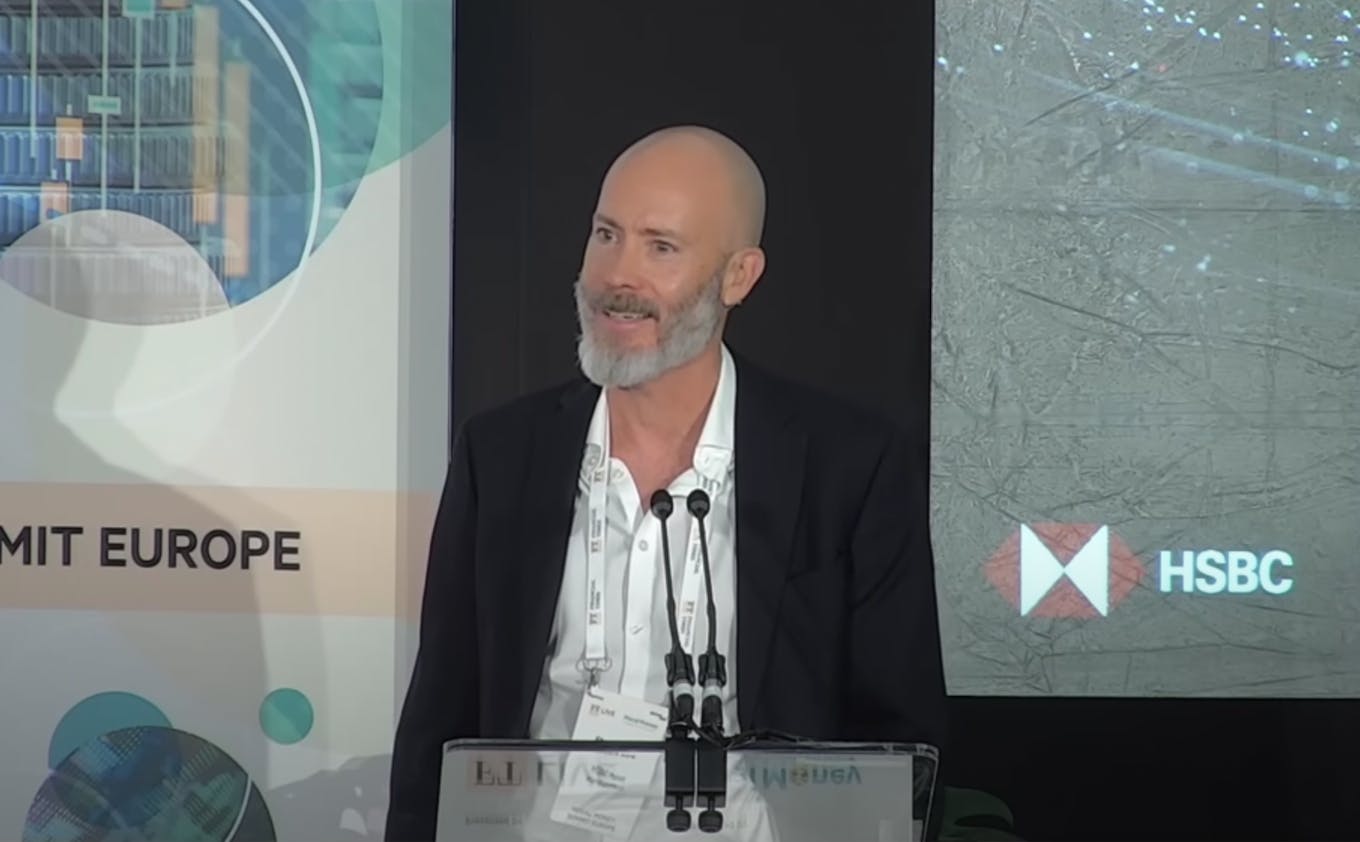
Stuart Kirk said: “I do have a beard which is my one sop to responsible investing” at the FT’s Moral Money event in May. Image: FT Live on YouTube
If ever there was a time that the job title “head of responsible investing” didn’t seem to fit the person in the job, it was a speech made by Stuart Kirk, HSBC Asset Management’s former global head of responsible investing, on 19 May.
Speaking at the uncomfortably named “Moral Money” conference hosted by the Financial Times, a sneering Kirk took an axe to, essentially, his job by declaring that “climate change is not a financial risk we need to worry about.”
Who cares if Miami is six metres under water in 100 years, we’ll adapt, he said. Amsterdam is a really nice place, and the Dutch capital has been six metres underwater “for ages”, he said.
Nevermind that almost the entire scientific community agrees that a few degrees of warming will devastate crops, lead to mass migration, irreversible tipping points, and billions in damages from nasty weather. These things are not financial risks worth worrying about yet, according to Kirk, who apparently hadn’t heard that much of the planet – particularly the Global South, where HSBC has been merrily financing coal-fired power stations – is already feeling the financial pinch of climate change.
Clearly relishing his role as a sustainable investing heretic, Kirk also dumped on an earlier presentation made by Sharon Thorne, the global board chair of Deloitte, saying he completely disagreed with her views on climate risk, and called out the former Bank of England governor Mark Carney, the United Nations, the World Economic Forum and others for “unsubstantied, shrill, partisan, apocalytic warnings” about climate calamity. “There’s always some nut job telling me about the end of the world,” he said.
In an opinion editorial headlined “Not so moral money?” published the day after Kirk’s speech, James Murray, the editor of BusinessGreen, wrote that if Kirk couldn’t see how climate breakdown could be a financial risk worth worrying about, he should “not be left to handle scissors unsupervised, let alone manage millions of pounds of other people’s money.”
Kirk was suspended and HSBC’s CEO said he disagreed with his assessment of climate risk. A few months later, there was a job vacancy for head of responsible investing at HSBC.
“Ironically given my job title, I have concluded that the bank’s behaviour towards me since my speech in May has made my position, well, unsustainable. Funny old world,” he wrote in a LinkedIn post announcing that he’d quit.
Two female prime ministers met. Are asked about their age
With a question that seemed to emerge from the dark ages, a reporter at a press conference asked the prime ministers of New Zealand and Finland – who happen to be women – if they met because they’re similar in age and have stuff in common.
Kiwi PM Jacinda Ardern was first to shoot down the reporter.
“I wonder if anyone ever asked [former US President] Barack Obama and [former New Zealand Prime Minister] John Key and if they met because they were of similar age,” said Ardern.
“We are meeting because we are Prime Ministers,” explained Finland Prime Minister Sanna Marin.
The reporter, Joey Dwyer of radio station Newstalk ZB, later deleted his social media accounts after a video clip of his question went viral.
The office naturalist

Chloe Ho, freelance office naturalist and sustainabilist. Image: Paramount Network Asia
Every office should have one of these people, whose job is to bring nature into the work place, we are told in a mockumentary by Paramount Asia Network. Chloe Ho is a freelance office naturalist – not to be confused with an office naturist, which is an even less common job – who spends her day stroking her colleagues with banana leaves, holding earthquake drills, and pretending to be a flower.
Chevron: The most precious kind of life is the dead kind
The world’s most enthusiastic obstructor of climate action, Chevron, had a spoof commercial made in its honour in October by Adam McKay, a writer and producer whose credits include the climate apocalypse comedy Don’t Look Up.
The ad is designed so that the viewer will be “lulled into a catatonic state that makes you forget one singular fact: Chevron is actively murdering you, every day,” the narrator chirps.
“At the end of the day, we at Chevron straight up don’t give a single f**k about you, your weird children or your stupid ratty-ass dog,” he says, soothingly.
“
We at Chevron straight up don’t give a single f**k about you, your weird children or your stupid ratty-ass dog.
Spoof Chevron ad
Plant-based protests
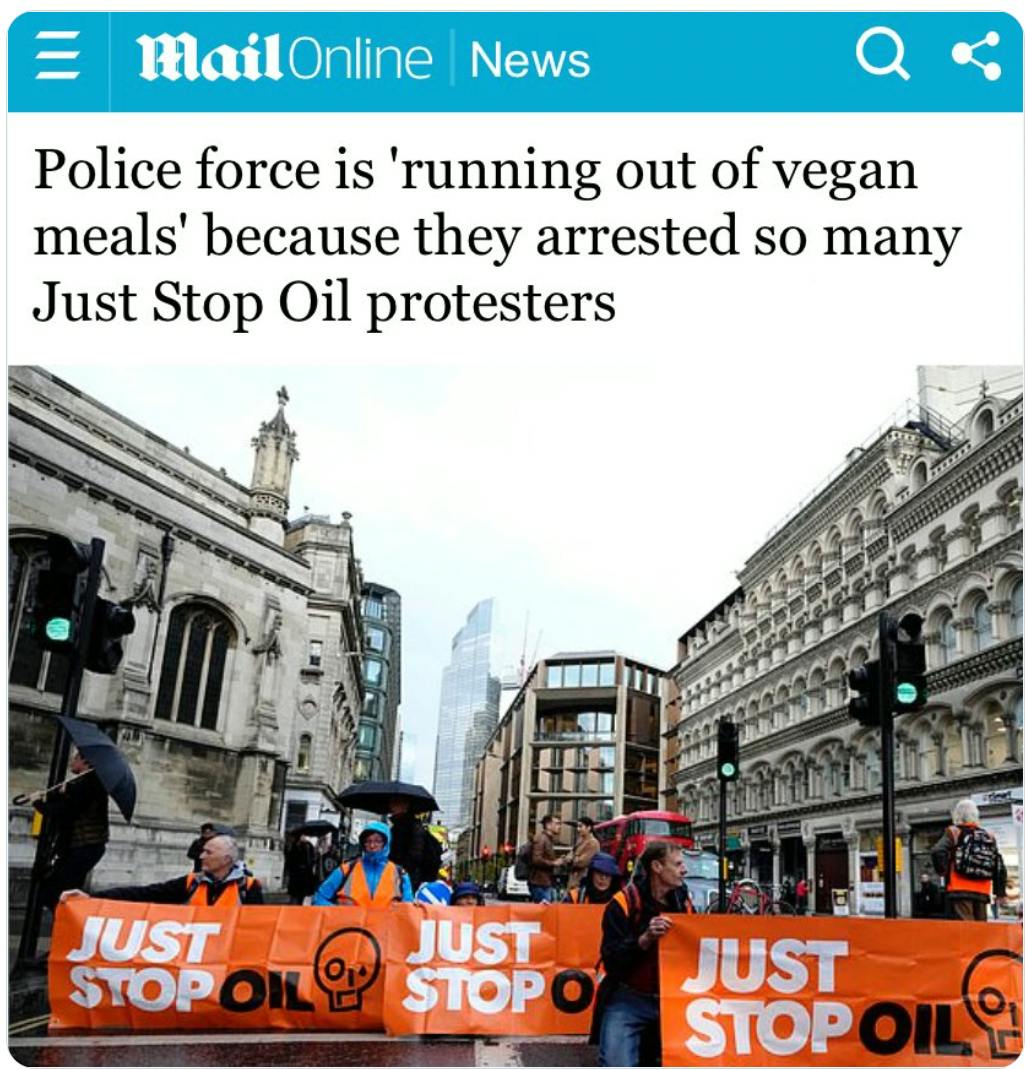
Stop oil (but not vegan ready meals). Image: MailOnline
In a story that is standard tabloid fare for the Mail Online, a rabble-rousing right-wing British tabloid, it emerged that protesters rallying against Big Oil were in danger of going hungry after they were detained in the county of Essex, famous for the trashy reality TV show The Only Way is Essex and the spiritual home of the English “chav“.
Turns out Essex police were running low on vegan meals to feed the 17 “Just Stop Oil” protesters, which the Mail reported caused a police rider to fall off his bike and two trucks to crash after one protester tried to climb a gantry on the M25 motorway that orbits London. A picture in the story is captioned to suggest a protester hanging from the gantry is taking a selfie while police look up from their motorbikes.
The protestors were held while awaiting a court appearance, which left the police scrambling for £1 (US$1.2) vegan ready-meals, the Mail reported.
No notes
2022 was the year that environmental activists got good at getting their message across while being held by police in the Superman position.
Taking a leak

Johnny Cash appearing to be relieving himself from a water tower. Image: The Wichita Eagle
Water scarcity is a serious problem for the citizens of Kingston, a town in the American state of Arkansas. But not to whoever shot a hole in a water tower to make it look like legendary country singer Johnny Cash, who hails from Kingston, taking a leak. An unknown person took careful aim at an image of the crooner painted on the water tower. The prankster not only made the town’s water situation worse but created a spike in emissions as people from all over the state drove to Kingston to see “the man in black” relieving himself on the ground below.
Candid about carbon offsets
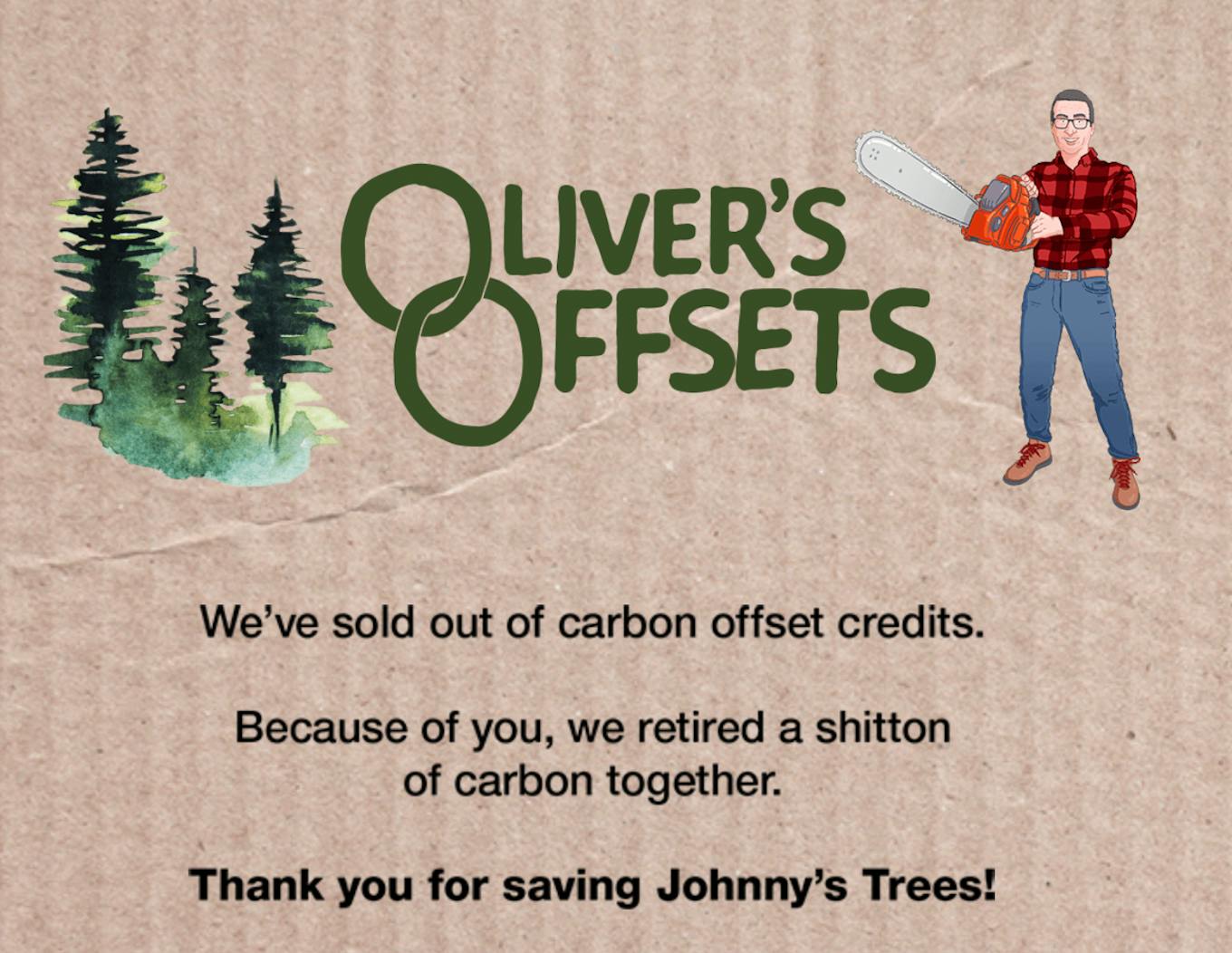
Oliver’s Offsets. Image: Oliversoffsets.org
In a jovial take-down of voluntary carbon markets, TV presenter John Oliver proved that the barrier for entry for carbon offsets is probably too low by setting up a carbon accrediting scheme of his own – Oliver’s Offsets, in which he offered not to cut down any of his trees for 5 minutes.
In a 23-minute video, Oliver drew attention to a service called YepYou that offsets the human breath and pets (50 US cents to offset your hamster!) and the madness of carbon credits that promise not to cut down trees, but only for a limited time. “It’s akin to selling a carbon credit for holding your breath for 15 seconds,” he quoted an expert as saying.
He also pointed out the folly of offsets that protect nature reserves that are already protected and private estates owned by American billionnaires used for hunting wild animals. “On some level, you probably know that carbon offsets are bullshit. Because you are a reasonably intelligent person,” he said.
Toon tutelage
Cartoonists arguably did a better job of explaining complex problems than journalists, scientists and almost certainly politicians this year.
Like this one, on why climate scientists find it hard to get heard.
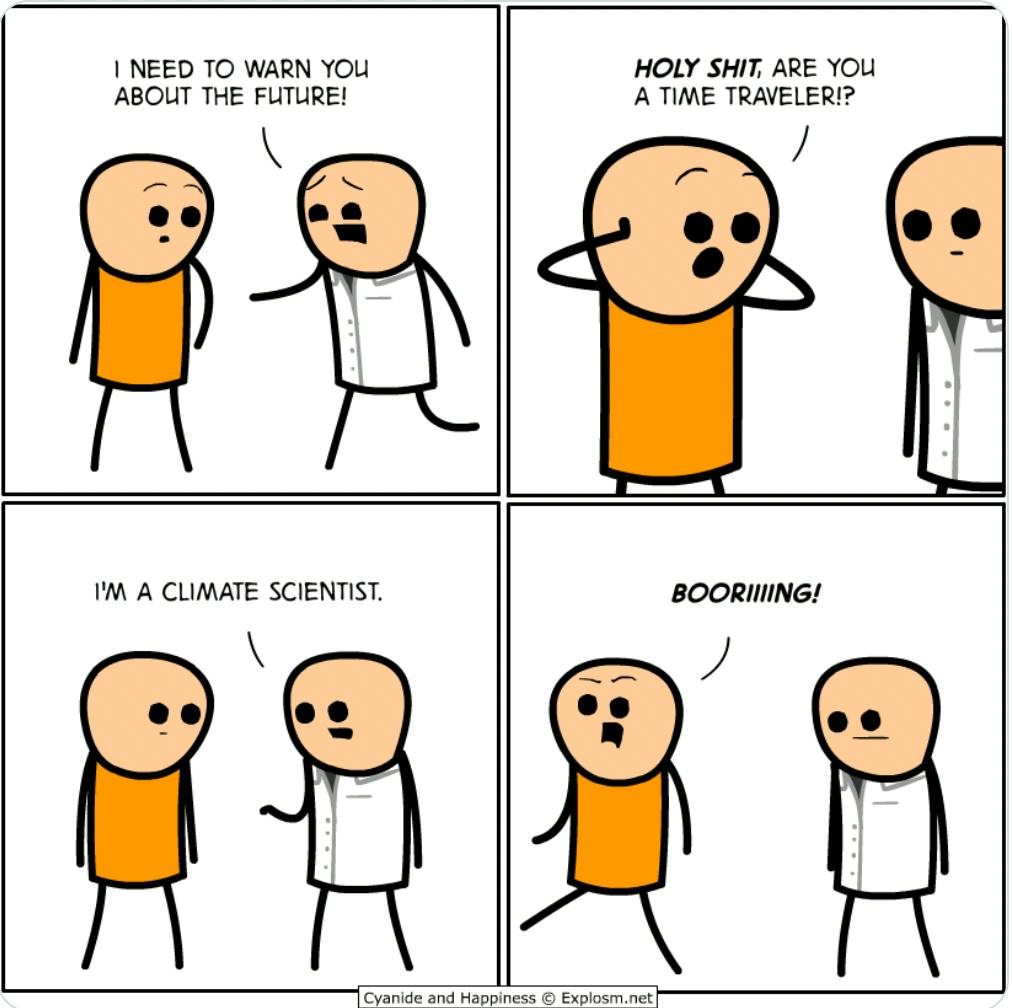
What people think of climate scientists. Image: Cyanide and Happiness, Explosm.net
And this one, which explains why people should probably care that there aren’t many insects around these days.
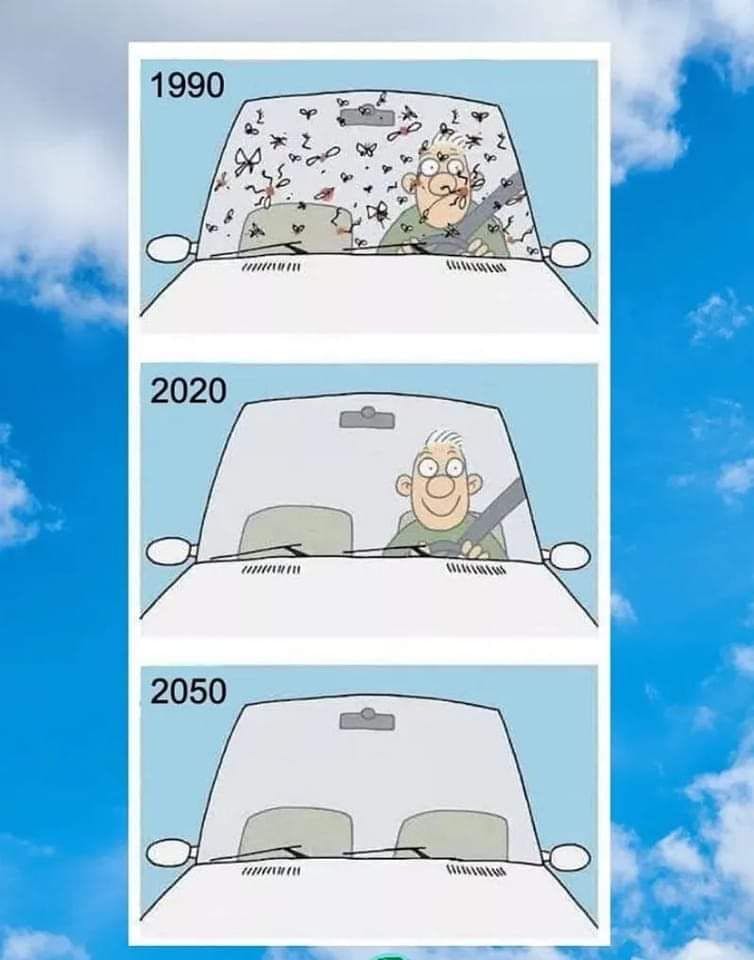
The decline in insect populations from widespread pesticide use and habitat loss is known as the “windscreen phenomenon: there are fewer dead insects on the windshields of people’s cars since the early 2000s. Image: SlowMoneyGreen
And this one. Humanity trying to save its way of life while raising the middle finger to nature.
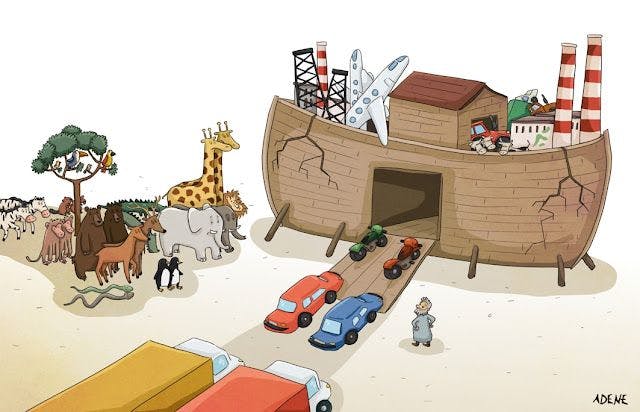
Humans only on Noah’s Ark: Image: Adenecartoon
Or this one, which ponders the impact of corporate sustainability.
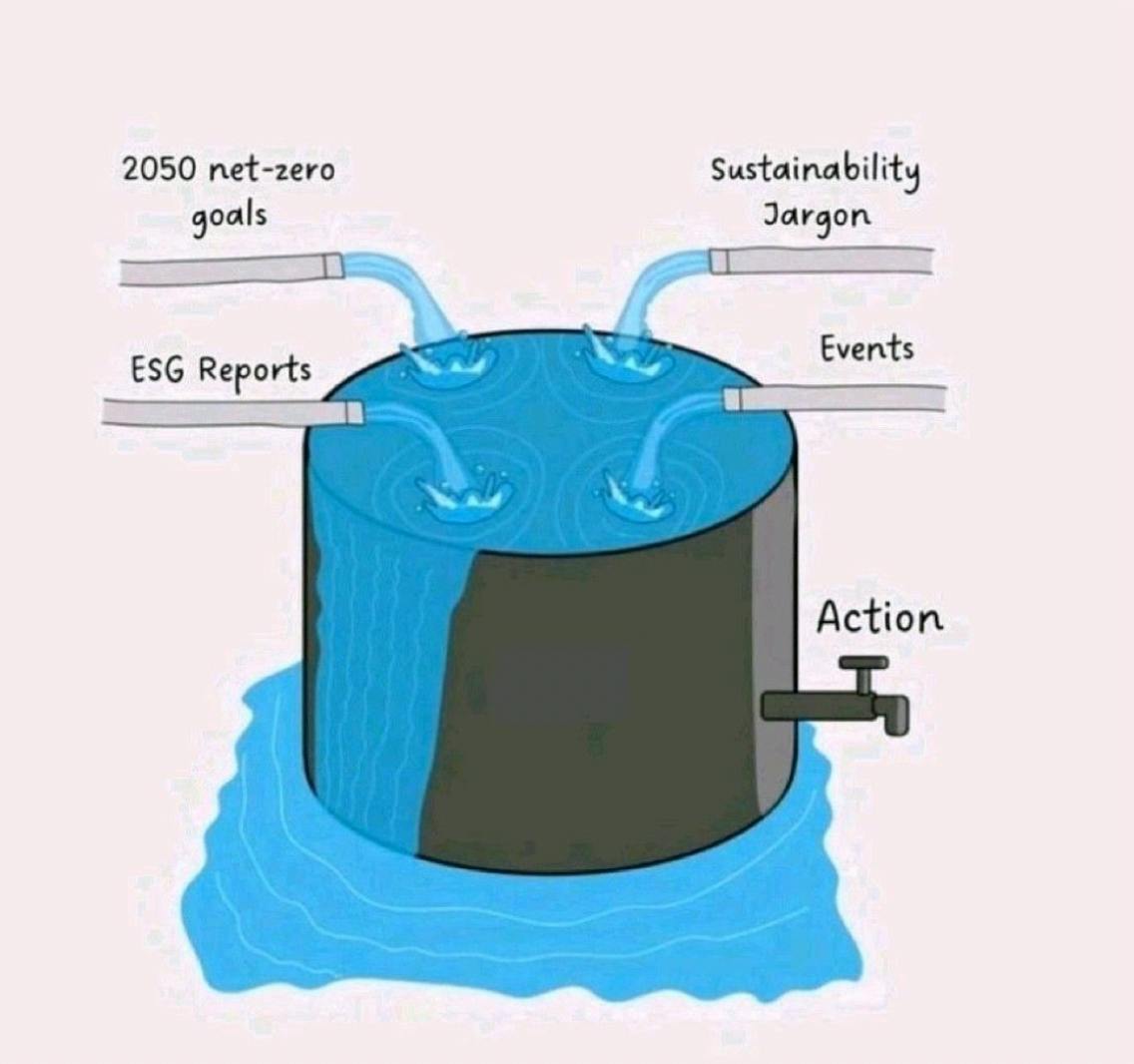
Where’s the impact from ESG? Image: Dmitry Andreev
Or this one, which suggests that preserving wetlands is probably a good idea unless we think flooding is fun.
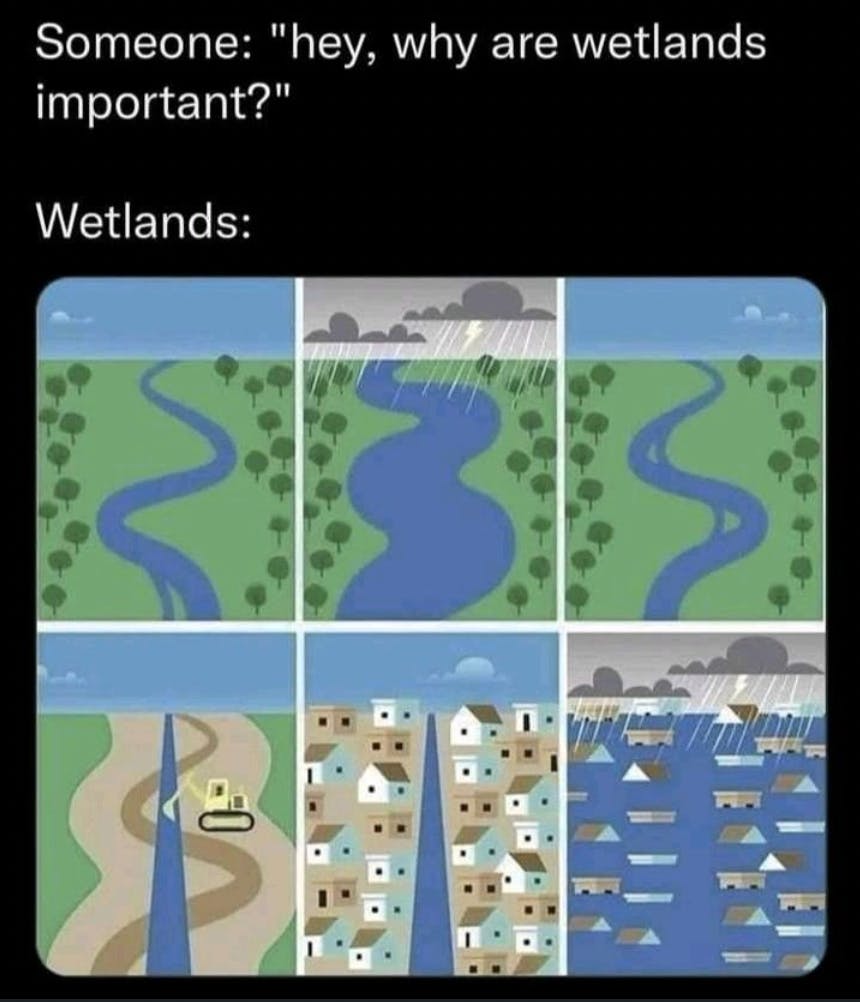
One of the many ecological services wetlands provide is to prevent flooding. Image: Australian Marine Conservation Society
Or this one, to explain greenwashing. It’s 15 years old, but resurfaced in a year that greenwashing claims started to make lawyers rich.
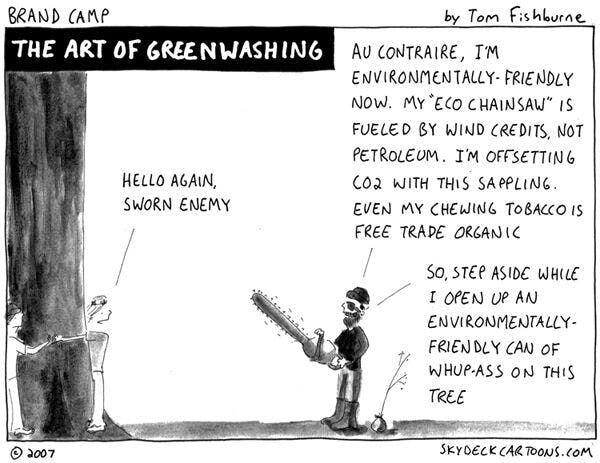
The art of greenwashing. Image: Skydeckcartoons.com
Or this one that suggests that politicians never let a good flooding go to waste.
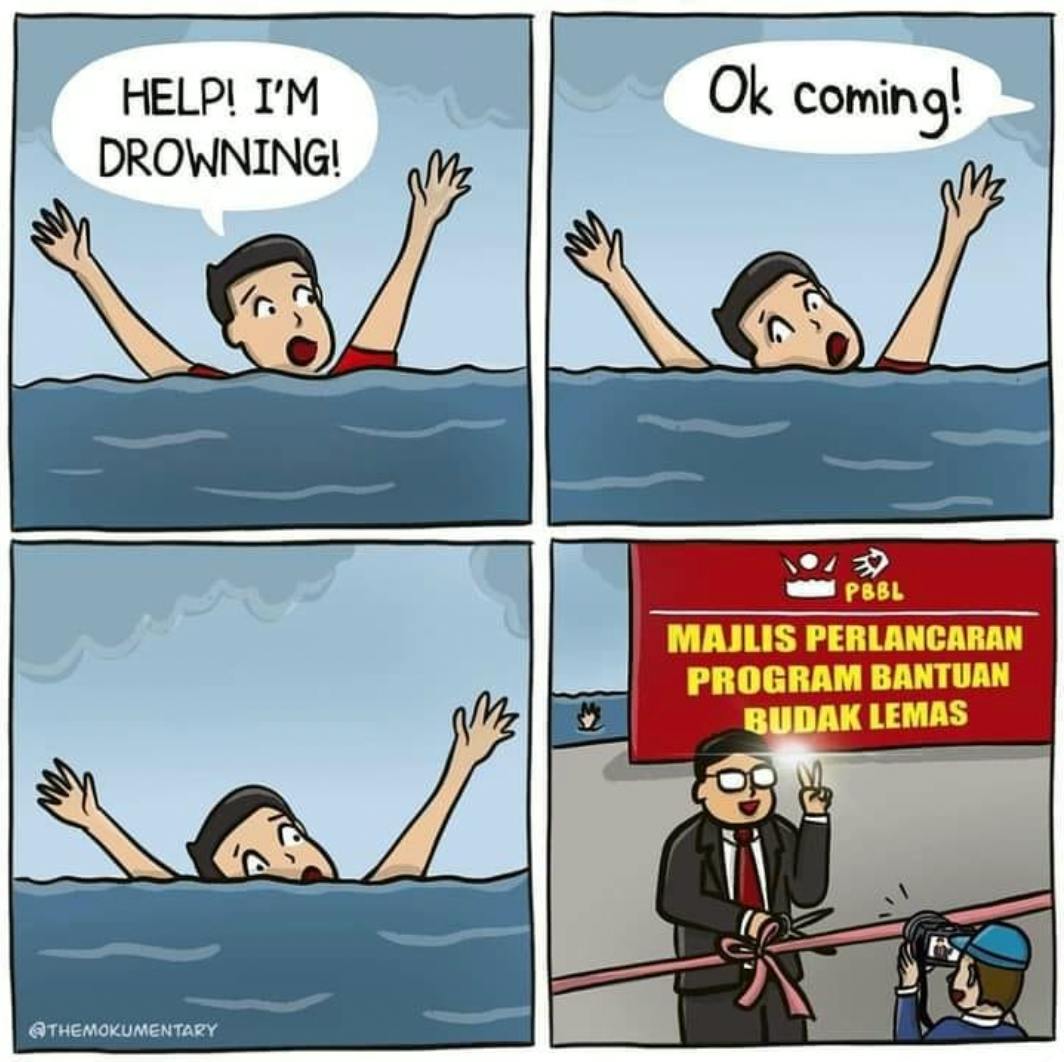
The sign reads: “Launch ceremony of programme to help drowning boys”. Image: The Mokumentary
And finally this one, which suggests that most people don’t really know what climate action is. Isn’t it going to COP?
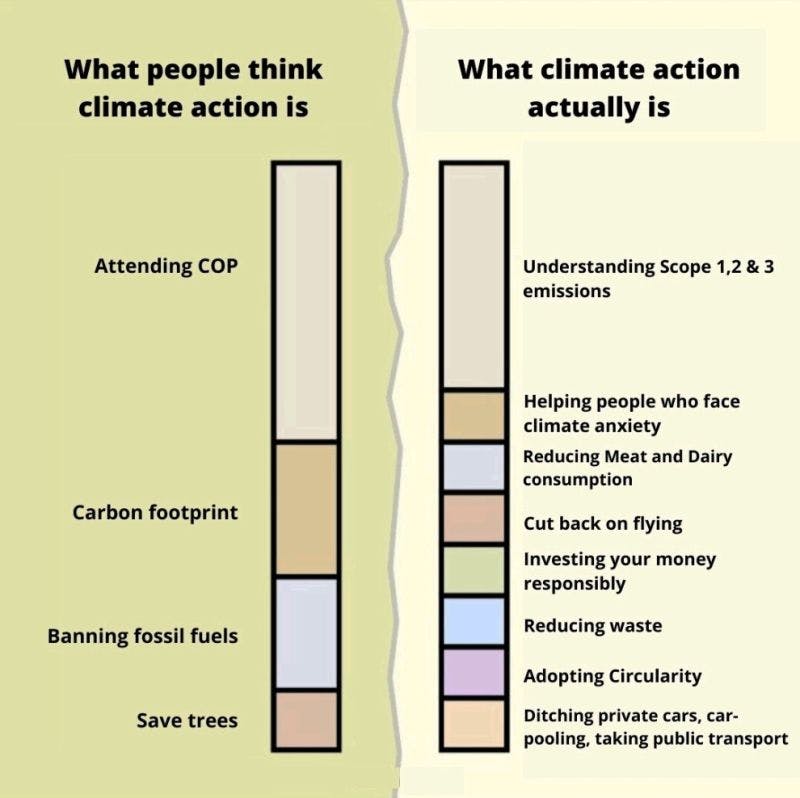
What climate action really is. Image: Dr Joerg Storm
Did we miss any? Let us know. This story is part of our Year in Review series, which journals the stories that shaped the world of sustainability in 2022.
